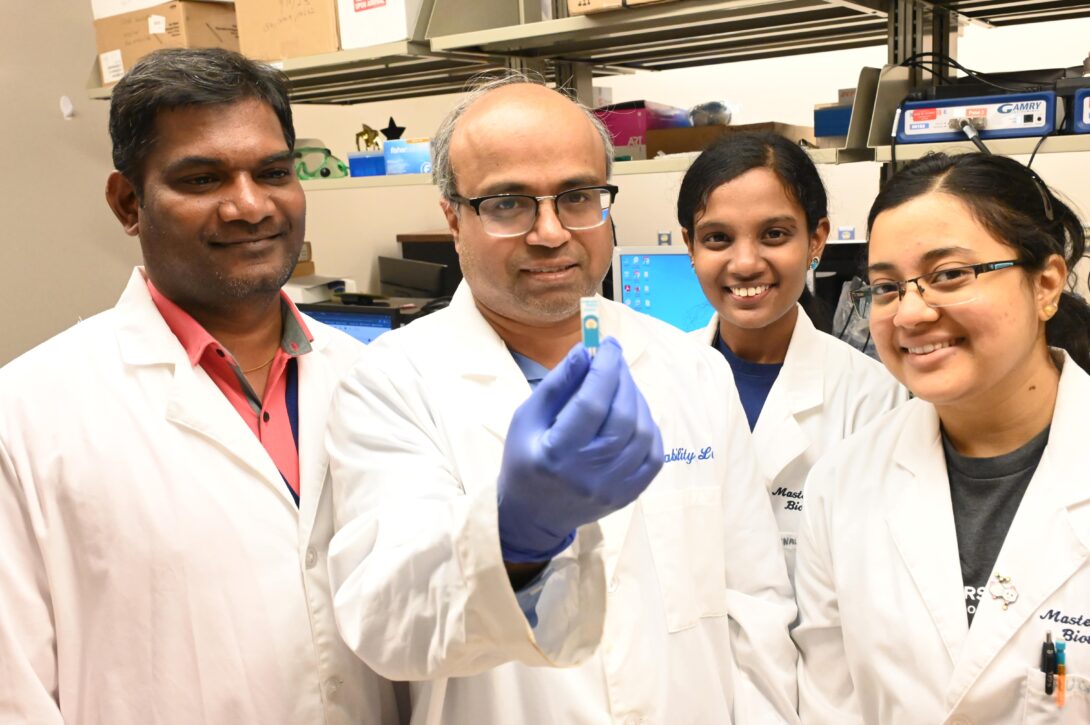Regenerative Medicine and Disability Research Laboratory
Regenerative Medicine and Disability Research Laboratory

Regenerative Medicine and Disability Laboratory Research Goals
The Regenerative Medicine and Disability Laboratory is part of the Department of Biomedical Sciences at the University of Illinois College of Medicine Rockford. Established through generous support of the Blazer Foundation, this lab is headed by Dr. Xue-Jun Li and Dr. Mathew Thoppil-Mathew who focus on fighting human motor neuron diseases and improving the integration of metal implants into the surrounding bone tissue, respectively. By combining stem cell biology, bioengineering, biomaterials, system biology, pharmacology and medicine, research in the RMDR lab aims to identify therapeutic agents, novel biomaterials and innovative approaches to improve clinical practice to provide better health care to patients with disabilities. Our long-term goals are to contribute to the community and to improve the quality of life of patients with disabilities.
Meetings
The RMDR Lab holds bi-monthly lab meetings. Lab members will have great opportunities to present a project, ask questions and participate in discussion. Meetings will be held every other Thursday at 11 am. Everyone is welcomed!
Address
RMDR Lab, E409
University of Illinois College of Medicine Rockford
Department of Biomedical Sciences
1601 Parkview Avenue
Rockford, IL 61107
Phone: (815) 395-5865
Fax: (815) 395-5666
Regenerative Medicine
Research in our group focuses on specifying neuronal subtypes from human pluripotent stem cells and using these stem cells to model motor neuron diseases, including spinal muscular atrophy and hereditary spastic paraplegias.
Human pluripotent stem cells have the capacity to become all cell types in the body, including neurons as they provide an invaluable tool for studying early human neural development and exploring the potential treatment of neurological diseases. By combining cellular, molecular, bioengineering and system approaches, our ultimate goal is to develop therapeutics for treatment of these debilitating diseases.
Research Projects
CURRENT PROJECTS:
- Dissecting the neuron-glia crosstalk in stem cell-based models of hereditary spastic paraplegias (HSP).
- Modeling recessive forms of HSP using patient-specific induced pluripotent stem cells.
- Establishing motor neuron reporters to study the development of human motor neurons.
- Determining motor neuron-specific degeneration in human stem cell models of spinal muscular atrophy.
- Identifying mechanisms underlying axonal generation and promoting nerve regeneration.
CURRENT FUNDED PROJECTS
UIC-UNAM Collaborative grant: ($20K, co-I, 2024-25)
- Project Title: Better treatment for the dental cavity
CHA-OSF Grant: ($100K-PI, 2024-25)
- Project Title: Electrochemical Biosensor for the pancreatic cancer
- NIH R01 grant: ($2M-R01 DE031832, M-PI)
- 10/1/2020 ~ 9/30/2025
- Multidimensional Microfluidic Salivary Sensor with Adversarial Knowledge Distillation for Point-of-Care Assessment of Periodontitis and Comorbidities
NIH R56 grant: ($400K-R56 AR070181, M-PI)
- 10/1/2022 ~ 9/30/2024
- Project Title: Corrosion Induced Hip Implant Failure: Synergistic Interactions of Patient, Materials, Surgical factors. The proposed project is to understand the role of microstructure on corrosion-induced hip implant failure.
COMPLETED FUNDED PROJECTS
UIC-Office of Technological Management (OTM) Pilot award: ($25K, PI, 2023-24)
- Project Title: Electrochemical Biosensor for the pancreatic cancer
UIC-UNAM Collaborative grant: ($20K, PI, 2022-23)
- Project Title: Saliva based biosensor for the oral cancer detection.
OTM Pilot award: ($25K, Co-PI, 2020-21)
- Project Title: Urine based Electrochemical Biosensor for the breast cancer research.
NIH RO1 grant: ($3M, R01 AR070181, M-PI, 2016-22)
- Project Title: Corrosion Induced Hip Implant Failure: Synergistic Interactions of Patient, Materials, Surgical factors. The proposed project is to understand the role of microstructure on corrosion-induced hip implant failure.
NIH RO3 grant: AR064005 ($100K, PI, 2019-22)
- Project Title: The role of degradation products (DPs) on alteration of DNA replication and repair mechanism in neural cell environment: Toxicology aspects, The proposed project is to understand the nanoparticle toxicity caused by hip implants
IADR Research grant: ($2K, Co-PI, 2020-21)
- Project Title: Tribocorrosion of dental implant, IADR
UIC-Office of Technological Management (OTM) Pilot award: ($30K, Co-PI, 2020-21)
- Project Title: Developing an electrochemical tool to eradicate the bacteria during the root canal treatment
Illinois Innovation Network (IIN) grant: ($20K, Co-PI, 2021-22)
- Project Title: Developing a diagnostic biosensor for breast cancer detection
Microport-Orthopedics: ($10K, PI, 2020-21)
- Project Title: Evaluation of corrosion risk from 3D printed shoulder implants
NSF grant: ($300K, NSF FDN 1160951, Co-PI, 2012-16)
- Project Title: Collaborative Research: Tribo-chemically Induced Gelation and Film Formation at Metal Interfaces. The proposed project is a collaborative effort aimed at understanding the formation of mechanically robust coatings at metal surfaces due to the combined action of both mechanical and electrochemical driving force.
NIH RO3 grant: ($100K, R03 AR064005, PI, 2012-16)
- Project Title: Tribocorrosion in Modular Hip Joint Junctions-A Parametric Mechanistic Study.The proposed project is to understand the fretting-corrosion mechanisms at the modular junction of metal-based hip implants.
AJTMS (The American Society of Temporomandibular Surgeon) foundation grant: ($5K, Co-PI, 2013-15)
- Project Title: Adopting Tribocorrosion science from the Hip implant to TMJ (Temporomandibular Joint). The proposed project is to understand the tribocorrosion mechanisms in a TMJ joint and comparison with Hip implants.
Rush Internal grant (RTSC), ($50K, Co-I, 2014-16)
- Project Title: Corrosion in modular hip implants: Identifying the ideal alloy microstructure.
NIH RC2 grant: ($1.2M, RC2 AR058993, Co-I, 2009-12)
- Project Title: Biotribolayer formation in metal-on-metal (MoM) hip joints. To demonstrate that the presence of a mechanically mixed zone will beneficially affect the corrosion and tribocorrosion behavior of the cobalt-chromium alloy.
More about the researchers:

Dr. Mathew Thoppil’s major research focus is in the area of simulation of human artificial joints, biomechanics and tribocorrosion of implanted biomaterials used in dentistry and orthopedics. Biomedical implants are increasingly used to assist the patients with disability and bring comfort and continue their healthy physical activities.

Dr. Li’s research focuses on specifying neuronal subtypes from human pluripotent stem cells and using these stem cell-derived neurons to study motor neuron and axonal degeneration. By combining cellular, molecular, bioengineering and system approaches, research in her lab aims to understand the pathogenic mechanisms of neurodegenerative diseases and to develop therapeutics for the treatment of these diseases.




